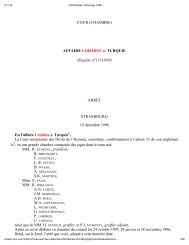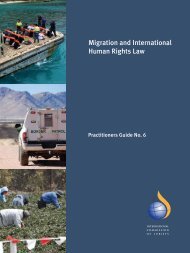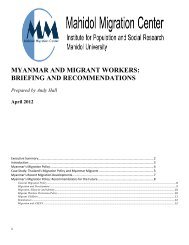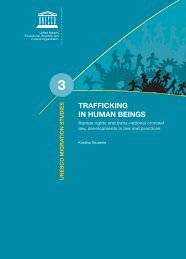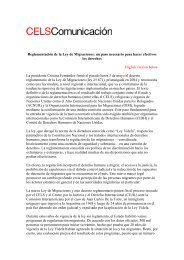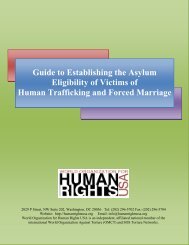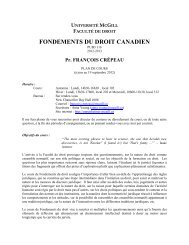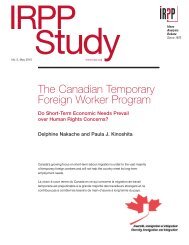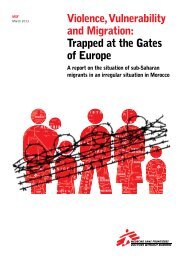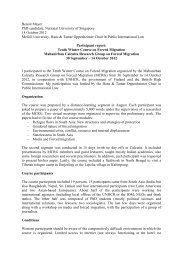Preventive Detention, Suspected Terrorists, and War
Preventive Detention, Suspected Terrorists, and War
Preventive Detention, Suspected Terrorists, and War
Create successful ePaper yourself
Turn your PDF publications into a flip-book with our unique Google optimized e-Paper software.
COLE FINAL<br />
7/1/2009 12:43 AM<br />
734 CALIFORNIA LAW REVIEW [Vol. 97:693<br />
mention the term “detention,” much less seek to define its proper confines.<br />
Others have argued that only those captured on the battlefield or foreign<br />
soil should be subject to military detention, at least as long as the ordinary<br />
courts are open <strong>and</strong> available at home. For example, several members of an en<br />
banc panel of the U.S. Court of Appeals for the Fourth Circuit concluded that<br />
only those captured on a foreign battlefield or as part of a foreign nation’s<br />
military could be detained as “enemy combatants.” 187 The judges maintained<br />
that they were only interpreting the AUMF, but their reasoning suggested that it<br />
might be unconstitutional to extend military detention any further. As a<br />
constitutional principle, this seems too restrictive. If an enemy fighter is<br />
captured outside the field of battle, but the capturing nation has reason to<br />
believe that he is in fact an enemy fighter, <strong>and</strong>, if let free, would resume<br />
hostilities against it, why should it be compelled to release him The Supreme<br />
Court’s decision in Ex parte Quirin, 188 upholding a war-crimes trial against<br />
members of the German military who were arrested in the United States, far<br />
from any battlefield, suggests that military-detention authority need not be<br />
limited to battlefield captures. Moreover, where the enemy affirmatively seeks<br />
to attack soft targets <strong>and</strong> kill civilians, as al Qaeda does, restricting military<br />
detention to those found on traditional battlefields would significantly<br />
hamstring U.S. defenses.<br />
Two courts—the U.S. Court of Appeals for the Fourth Circuit <strong>and</strong> the<br />
Israeli Supreme Court—recently addressed the question of who may be<br />
detained as “enemy combatants” in armed conflicts with terrorist organizations.<br />
Both did so as a matter of domestic law, but with explicit reference to the<br />
international law of war (which informs statutory interpretation in both Israel<br />
<strong>and</strong> the United States). Both courts also took into account the need to adapt the<br />
law of war to the changed circumstances presented by military conflicts with<br />
nonstate terrorist organizations. Their decisions provide helpful guidance in<br />
determining the appropriate scope of “enemy combatant” detention in a<br />
military conflict with a terrorist organization.<br />
The Fourth Circuit, in Al-Marri, considered whether a Qatari citizen<br />
lawfully residing in the United States could be detained as an enemy<br />
combatant. 189 Al-Marri was arrested on criminal charges related to identity<br />
fraud <strong>and</strong> lying to FBI agents, but was transferred to military custody shortly<br />
before he was to go on trial. 190 The United States alleged that al-Marri trained<br />
in an al Qaeda training camp, worked closely with <strong>and</strong> took orders from al<br />
Qaeda leaders, <strong>and</strong> came to the United States as an al Qaeda agent for the<br />
187. See Al-Marri v. Pucciarelli, 534 F.3d 213, 217-53 (4th Cir. 2008) (Motz, J.,<br />
concurring).<br />
188. 317 U.S. 1, 19-20 (1942).<br />
189. Al-Marri, 534 F.3d at 219.<br />
190. Id.



